 Petzlover
Petzlover Sokoke is originated from United States but Ukrainian Levkoy is originated from Ukraine. Both Sokoke and Ukrainian Levkoy are of same weight. Both Sokoke and Ukrainian Levkoy has almost same life span. Both Sokoke and Ukrainian Levkoy has same litter size. Both Sokoke and Ukrainian Levkoy requires Low Maintenance.
Sokoke is originated from United States but Ukrainian Levkoy is originated from Ukraine. Both Sokoke and Ukrainian Levkoy are of same weight. Both Sokoke and Ukrainian Levkoy has almost same life span. Both Sokoke and Ukrainian Levkoy has same litter size. Both Sokoke and Ukrainian Levkoy requires Low Maintenance.
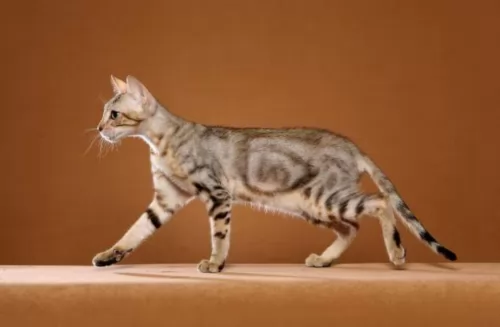 Compared to other breeds of cat, the rare Sokoke Forest Cat is a fairly new natural breed. It comes from the Sokoke district of eastern Kenya but was developed in the USA.
Compared to other breeds of cat, the rare Sokoke Forest Cat is a fairly new natural breed. It comes from the Sokoke district of eastern Kenya but was developed in the USA.
It is in fact, named after the Arabuko Sokoke National Forest, from where the wild foundation stock came from. Wildlife artist Jeni Slater started breeding these cats in the 1970s. They eventually reached Denmark, where further breeding continued, with the cat becoming popular with local cat fanciers, and laid the foundation of the breed in Europe.
Today, there are just a few breeders registered in the UK and TICA, The International Cat Association lists the Sokoke cat as a New Preliminary Race and it was recognized by FIFe in 1993.
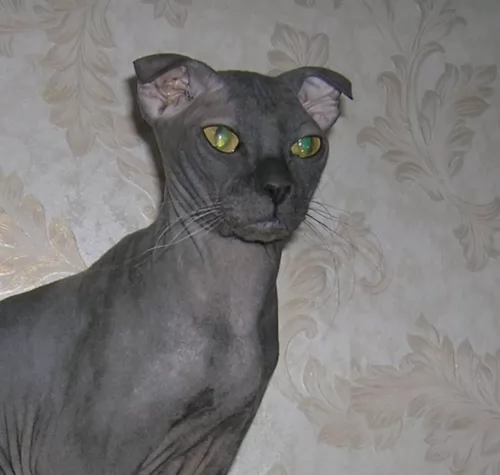 The Ukrainian Levkoy is a distinctive looking cat with its folded ears. This is a new breed of cat, only being developed recently early in the 2000s.
The Ukrainian Levkoy is a distinctive looking cat with its folded ears. This is a new breed of cat, only being developed recently early in the 2000s.
The cat was first developed by Elena Biriukova in Ukraine, by crossing the hairless Donskoy cat with the Scottish Fold. Also, Oriental and domestic cats were also brought into the mix.
This particular cat breed was recognized in 2005 in Ukraine and recognized in Russia in 2010. The cat isn’t recognized by any of the major international cat organizations.
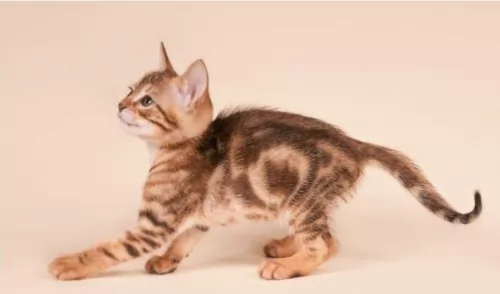 The Sokoke is a medium-sized cat with a long, lean body and slender legs. The hind legs are somewhat longer than the front legs. The head is smallish and round and he has a constantly alert look to him.
The Sokoke is a medium-sized cat with a long, lean body and slender legs. The hind legs are somewhat longer than the front legs. The head is smallish and round and he has a constantly alert look to him.
A striking characteristic of the Sokoke cat is its tabby fur, which people say looks like the bark of a tree and it is brindle in coloring.
The tail is medium to long and the ears are also fairly large, The eyes are large and almond-shaped and can be greenish to brown. The coat is short and coarse.
Cat lovers enjoy these playful, curious, intelligent, and family-orientated cats. In spite of their wild side, they adapt easily into different homes.
They’re inquisitive and will follow you, much like a dog. They will even enjoy a leash being put on them and being taken for a walk. They’re very sociable and vocal too and get on with everyone, children and other pets included.
They’re playful cats, loving to jump and climb and then look down at you from their high perches. Easily bored, you will need to provide fun and games continuously.
They enjoy being involved with everything you’re doing and form a strong bond with their owners. Because the Sokoke is social and affectionate, they require quite a lot of attention, and if they don’t get the attention they crave, they meow in anxiety.
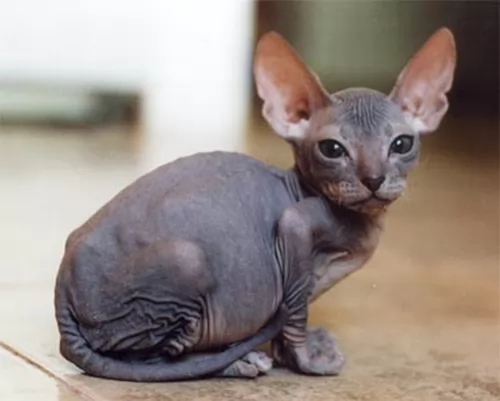 With his distinctive appearance, the medium-sized, muscular but slender Ukrainian Levkoy cat weighs in the region of 3 to 6kg.
With his distinctive appearance, the medium-sized, muscular but slender Ukrainian Levkoy cat weighs in the region of 3 to 6kg.
He has these inward-folding ears with very little hair. These are two distinctive features of this cat. The skin is soft and wrinkled, the eyes large and almond-shaped while the ears are also large and set wide apart and high on the wedge-shaped head.
He has long, slender legs and a narrow tail. The litter size of these cats is generally 3 to 6.
Friendly and playful, the Ukranian Levkoy is also intelligent and enjoys having human companionship.
He is social and will make friends of other pets in the house. He is also compatible with children.
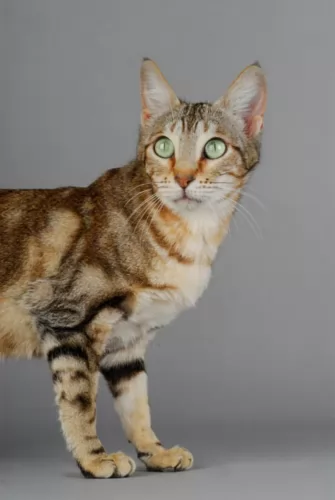 Your Sokoke is a very social cat and he will get on particularly well in a home with children who have been taught to be kind and gentle with animals.
Your Sokoke is a very social cat and he will get on particularly well in a home with children who have been taught to be kind and gentle with animals.
They are able to adapt well to homes where there are other pets too. They just love exercise and lots of fun. They don’t like being in a home where the owner is out at work all day. The solution to this is to provide him with another cat as a companion.
Sokoke cats are great with people of all ages, and when you bring one of these lively cats into your home, make sure he also receives his share of love and companionship.
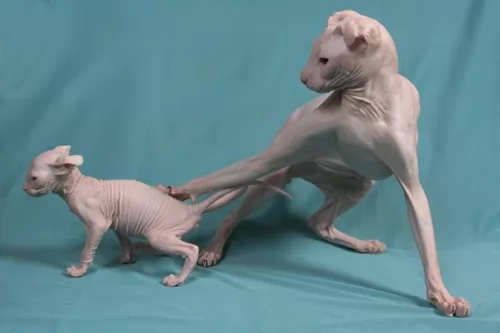 The Ukrainian Levkoy, even though he is fairly docile, is a very sociable cat that thrives on human interaction.
He is able to get on well with children as well as with other pets. He is also quite a vocal cat and will let you know when he is hungry or wants to play. Some call them ugly and others call them sweet - whatever you make of the Ukranian Levkoy, he needs your love and care to be the best pet he can be.
The Ukrainian Levkoy, even though he is fairly docile, is a very sociable cat that thrives on human interaction.
He is able to get on well with children as well as with other pets. He is also quite a vocal cat and will let you know when he is hungry or wants to play. Some call them ugly and others call them sweet - whatever you make of the Ukranian Levkoy, he needs your love and care to be the best pet he can be.
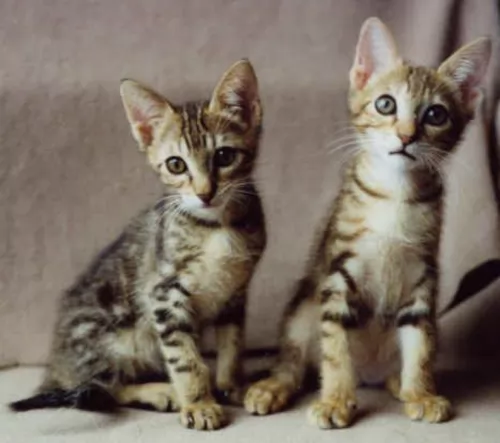 Sokoke cats are generally healthy and have no inherited diseases. To ensure that your Sokoke stands a chance of having a healthy life, you need to have him vaccinated against the life-threatening cat diseases there are.
Sokoke cats are generally healthy and have no inherited diseases. To ensure that your Sokoke stands a chance of having a healthy life, you need to have him vaccinated against the life-threatening cat diseases there are.
If your Sokoe cat isn’t his usual self day after day, make a point of getting him to the vet just as soon as possible.
Parasites are a terrible scourge with cats, and in fact, the number one cause of hair loss in cats is fleas. The bite of a flea can cause an allergic reaction. Your cat can become miserable with continuous biting, itching, and scratching and this can all lead to hair loss.
It is a wise move to speak to your vet about a good product to treat your furry friend with.
There can actually be many causes of diarrhea in cats and one of them is parasites, but it can also be caused by a viral infection or food allergy or something else.
You want to get your cat to the vet who can help you bring it under control. You may also have to feed your cat a bland kind of diet to help the cat’s digestive tract recover from the diarrhea.
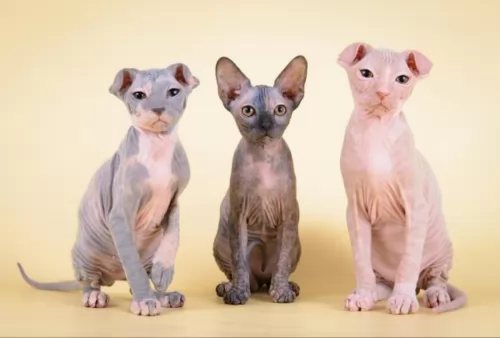 These cats are generally considered to be healthy cats. Having said that, they can be predisposed to the same conditions that the Donskoy and Scottish Fold breeds face.
These cats are generally considered to be healthy cats. Having said that, they can be predisposed to the same conditions that the Donskoy and Scottish Fold breeds face.
It is always beneficial to know and recognize some of the symptoms of a sick cat - lethargy, vomiting, diarrhea, heavy breathing and lack of appetite. Then it's time to schedule a visit to your local vet.
While there aren't any breed-specific health problems associated with the Ukrainian Levkoy, it is imperative to have him vaccinated against the deadly cat diseases that there are.
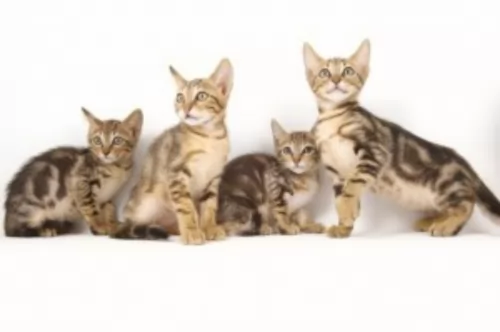 Because the Sokoke’s coat is short and close-lying, with little or no undercoat, brushing once a week will be sufficient.
Because the Sokoke’s coat is short and close-lying, with little or no undercoat, brushing once a week will be sufficient.
The Sokoke cat is very energetic, and he will need games, toys, and attention to keep him physically and mentally stimulated. They love climbing so a climbing tree and other kind of equipment will be a good idea.
Provide your cat with a litter box and ensure it is kept scrupulously clean by removing the cat’s feces every single day.
Diet is of critical importance to the health and happiness of a cat. Some people try to feed their cats human foods and wonder why their cat is continuously sick. A cat is a carnivore and he requires meat.
You can speak to your vet about the best kind of commercial cat food there is for your cat. Read the label and feed him portion-sizes as directed.
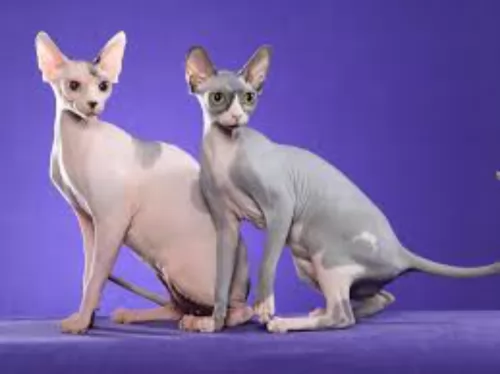 As with all cats, it's important to keep up your Ukrainian Levkoy's regular veterinary checkups. This means you can get to any health concerns early so that your vet can come up with a treatment plan for your pet.
As with all cats, it's important to keep up your Ukrainian Levkoy's regular veterinary checkups. This means you can get to any health concerns early so that your vet can come up with a treatment plan for your pet.
Some cat lovers make a point of scheduling yearly wellness visits with their vet, and this can be a good thing. Cats are natural scratchers so make sure you invest in a scratching post for him.
The inside of the Ukrainian Levkoy's ears should be examined regularly for signs of dirt and wax build-up. It can lead to infection. Speak to your vet about your cat's ears if yourself.
The Ukrainian Levkoy is an active cat and if he is an indoor cat, he will definitely need a climbing tree or some kind of cat perch to leap up onto.
The Ukrainian Levkoy is a hairless cat, so you won't brushing your cat's hair but he will need to have a bath. The skin can become oily and attract dirt. Diet is absolutely important. You'll need to make sure you're feeding your cat a high protein diet as every cat is a carnivore. A cat like this needs to stay in shape to avoid cat diseases related to being overweight.
Most Ukrainian Levkoys need to be kept warm, so you might well have to invest in a jacket or jersey to keep him warm on a cold day.